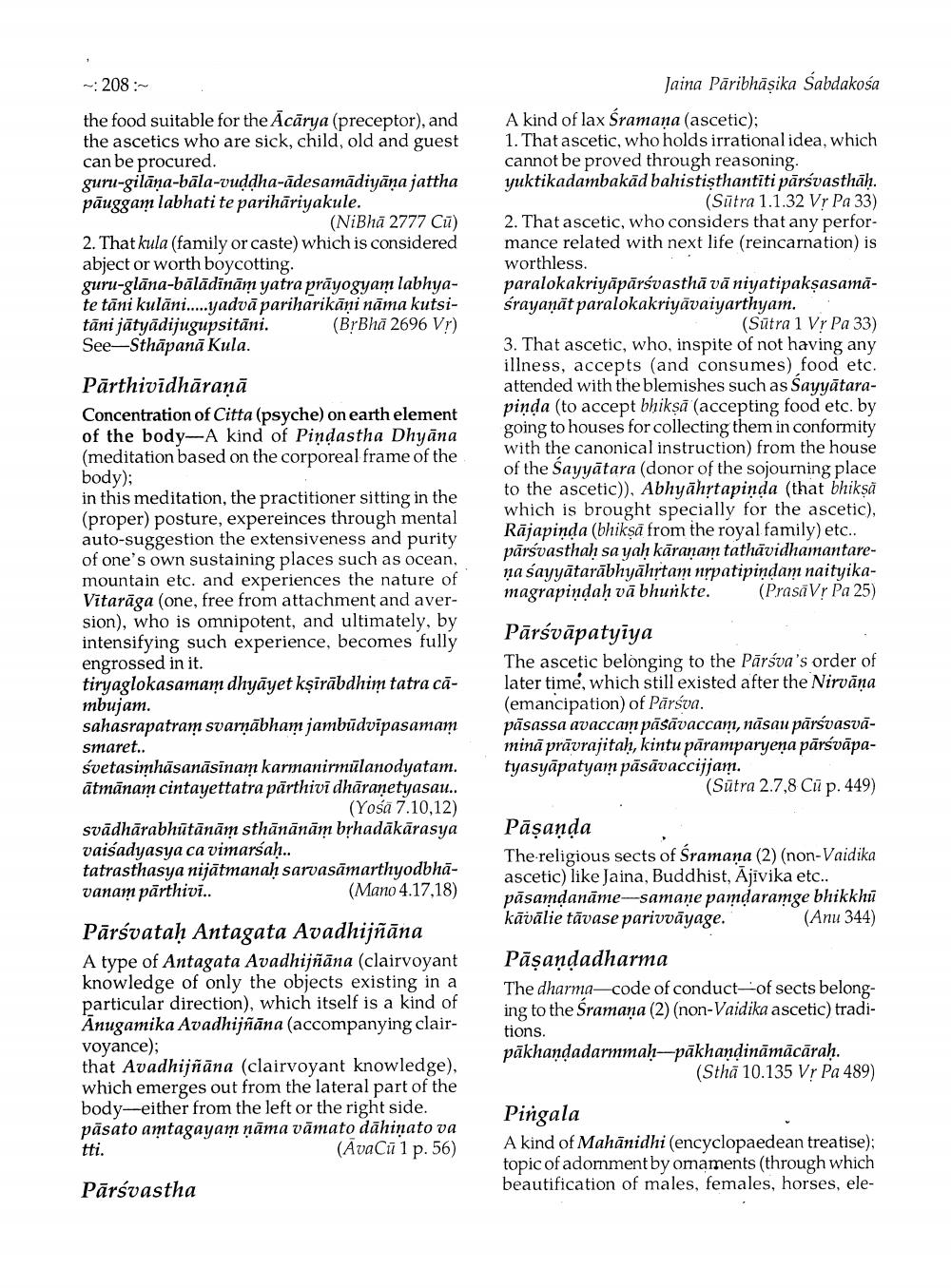________________
- 208 :
the food suitable for the Ācārya (preceptor), and the ascetics who are sick, child, old and guest can be procured. guru-gilāna-bāla-vuddha-ādesamādiyāna jattha pāuggam labhati te parihāriyakule.
(NiBhā 2777 Cu) 2. That kula (family or caste) which is considered abject or worth boycotting. guru-glāna-bālādinām yatra prāyogyam labhyate tāni kulāni.....yadvā pariharikāņi nāma kutsitāni jātyādijugupsitāni. (BrBhā 2696 Vr) See-Sthāpanā Kula.
Jaina Pāribhāșika Sabdakośa A kind of lax śramaņa (ascetic); 1. That ascetic, who holds irrational idea, which cannot be proved through reasoning. yuktikadambakād bahistişthantiti pārsvasthāh.
(Sūtra 1.1.32 Vr Pa 33) 2. That ascetic, who considers that any performance related with next life (reincarnation) is worthless. paralokakriyāpārsvasthā vā niyatipakşasamasrayaņāt paralokakriyāvaiyarthyam.
(Sūtra 1 Vr Pa 33) 3. That ascetic, who, inspite of not having any illness, accepts (and consumes) food etc. attended with the blemishes such as Sayyātarapinda (to accept bhikṣā (accepting food etc. by going to houses for collecting them in conformity with the canonical instruction) from the house of the Sayyātara (donor of the sojourning place to the ascetic)), Abhyāhrtapinda (that bhikṣā which is brought specially for the ascetic), Rājapinda (bhikṣā from the royal family) etc.. pārsvasthah sa yah kāraṇam tathāvidhamantareņa sayyātarābhyāhrtam nrpatipindam naityikamagrapindaḥvā bhunkte. (PrasãVr Pa 25)
Pārthividhāraņā Concentration of Citta (psyche) on earth element of the body-A kind of Pindastha Dhyāna (meditation based on the corporeal frame of the body); in this meditation, the practitioner sitting in the (proper) posture, expereinces through mental auto-suggestion the extensiveness and purity of one's own sustaining places such as ocean, mountain etc. and experiences the nature of Vitarāga (one, free from attachment and aversion), who is omnipotent, and ultimately, by intensifying such experience, becomes fully engrossed in it. tiryaglokasamam dhyāyet kşirābdhim tatra cāmbujam. sahasrapatram svarņābhamjambūdvipasamam Smaret.. svetasimhāsanāsīnam karmanirmūlanodyatam. ātmānam cintayettatra pārthivi dhāranetyasau..
(Yośā 7.10,12) svādhārabhūtānām sthānānām brhadākārasya vaiśadyasya ca vimarśaḥ.. tatrasthasya nijātmanah sarvasāmarthyodbhāvanam pārthivi..
(Mano 4.17,18)
Pārsvāpatyiya The ascetic belonging to the Pārsva's order of later time, which still existed after the Nirvāņa (emancipation) of Pārsva. pāsassa avaccampāsāvaccam, nāsau pārsvasvaminā prāvrajitaḥ, kintu paramparyeņa pārsvāpatyasyāpatyam pāsāvaccijjam.
(Sūtra 2.7,8 Cü p. 449)
Pāşanda The religious sects of śramana (2) (non-Vaidika ascetic) like Jaina, Buddhist, Ajivika etc.. pāsamdanāme---samane pamdaramge bhikkhu kāvālie tāvase parivvāyage.
(Anu 344)
Pārsvatah Antagata Avadhijñāna A type of Antagata Avadhijñāna (clairvoyant knowledge of only the objects existing in a particular direction), which itself is a kind of Anugamika Avadhijñāna (accompanying clairvoyance); that Avadhijñāna (clairvoyant knowledge), which emerges out from the lateral part of the body-either from the left or the right side. päsato amtagayam ņāma vāmato dāhiņato va
(AvaCū 1 p. 56)
Pāşandadharma The dharma-code of conduct-of sects belonging to the Sramaņa (2) (non-Vaidika ascetic) traditions. pākhandadarmmah-pākhandināmācāraḥ.
(Sthā 10.135 Vr Pa 489)
tti.
Pingala A kind of Mahānidhi (encyclopaedean treatise); topic of adornment by ornaments (through which beautification of males, females, horses, ele
Pārsvastha




